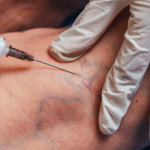Chronic angina, or chest pain that occurs repeatedly due to reduced blood flow to the heart, can significantly impact one’s quality of life. While not curable, chronic angina is manageable through lifestyle modifications and medical treatment.
In this blog, we will explore effective treatment options and lifestyle changes that can help relieve chronic angina symptoms.

Content
Medication Prescription
Medications are an essential part of chronic angina treatment. One such medication is Ranexa, which works by reducing the workload of the heart. By taking a Ranexa coupon, patients can access this treatment affordably.
Ranexa has been shown to reduce the frequency and severity of angina episodes when used along with standard angina medications like beta blockers and calcium channel blockers. Nitroglycerin is another quick-acting option that provides relief within minutes of an angina episode by dilating blood vessels. Long-acting forms are also available for around-the-clock protection. Discussing medication options with your doctor can help determine the best regimen.
Lifestyle Changes
Making positive lifestyle modifications, especially when combined with medication, can significantly improve chronic angina symptoms. Some effective lifestyle strategies include:
- Diet: Eating a heart-healthy diet low in saturated and trans fats can benefit those with chronic angina. Focus on whole grains, fruits/veggies, lean proteins and healthy fats.
- Exercise: Regular moderate exercise like brisk walking trains the heart and improves its function over time. Start slowly and listen to your body.
- Weight management: Excess weight puts extra strain on the heart. Losing even 5-10 pounds through diet and exercise can ease angina symptoms.
- Stress relief: High stress levels can trigger angina. Try relaxation techniques like yoga, meditation, deep breathing.
- Smoking cessation: Smoking severely constricts blood vessels and worsens angina. Kicking the habit is critical for recovery.
- Alcohol in moderation: Heavy drinking stresses the heart. Men should limit to 1-2 drinks daily, women to 1.
When to Seek Help
While lifestyle changes and medications can effectively manage chronic angina for many, it’s important to recognize warning signs that indicate a need for prompt medical attention. These include:
- Angina episodes lasting more than 10 minutes despite rest and nitroglycerin
- Increased frequency or intensity of angina symptoms
- Angina occurring during rest
- Angina accompanied by shortness of breath, nausea/vomiting, weakness or dizziness
- New onset of angina after age 40
The takeaway is that with adherence to treatment and heart-healthy habits, individuals with chronic angina can experience substantial relief and maintain a good quality of life. Always consult your doctor to create a customized management plan and report any concerning symptoms immediately. With proper care, chronic angina need not rule one’s daily activities.

Alissa Edwards a health blogger, but her words have the power to change your life. She is an avid reader and she loves nothing more than curling up with a good book. She always strives for perfection in everything she does, so it’s no surprise that she plans on becoming the next JK Rowling one day!








